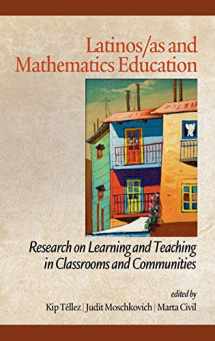
Latinos/As and Mathematics Education: Research on Learning and Teaching in Classrooms and Communities (Hc) (Research in Educational Diversity and Excellence)
Book details
Summary
Description
A volume in Research in Educational Diversity and Excellence Series Editors Hersh C. Waxman and Yolanda N. Padrón, Texas A&M University This book that explores the mathematics education of Latinos/as in 13 original research studies. Each chapter represents research that grounds mathematics instruction for Latinos/as in the resources to be found in culture and language. By inverting the deficit perspective, this volume redresses the shortcomings found in the previous literature on Latino/a learners. Each study frames language (e.g. bilingualism) not as an obstacle to learning, but as a resource for mathematical reasoning. Other chapters explore the notion of cultural variation not as a liability but as a tool for educators to build upon in the teaching of mathematics. Specifically, the book reframes culture as a focus on the practices, objects, inscriptions, or people that connect mathematical concepts to student thinking and experiences, both in and out of school. The book's four sections divide the research: The first section of the book focuses on mathematic learning in classrooms, specifically exploring bilingual, Latino/a students; the second section explores Latino/a learners in communities, including the role parents can play in advancing learning; the third section includes chapters focused on teacher professional growth; the final section concerns the assessment (and mis-assessment) of Latino/a learners. The research shared in this volume provides ample evidence that mathematics educators who choose to ignore language or culture in their pedagogy risk shortchanging their Latino/a students.


We would LOVE it if you could help us and other readers by reviewing the book
Book review



